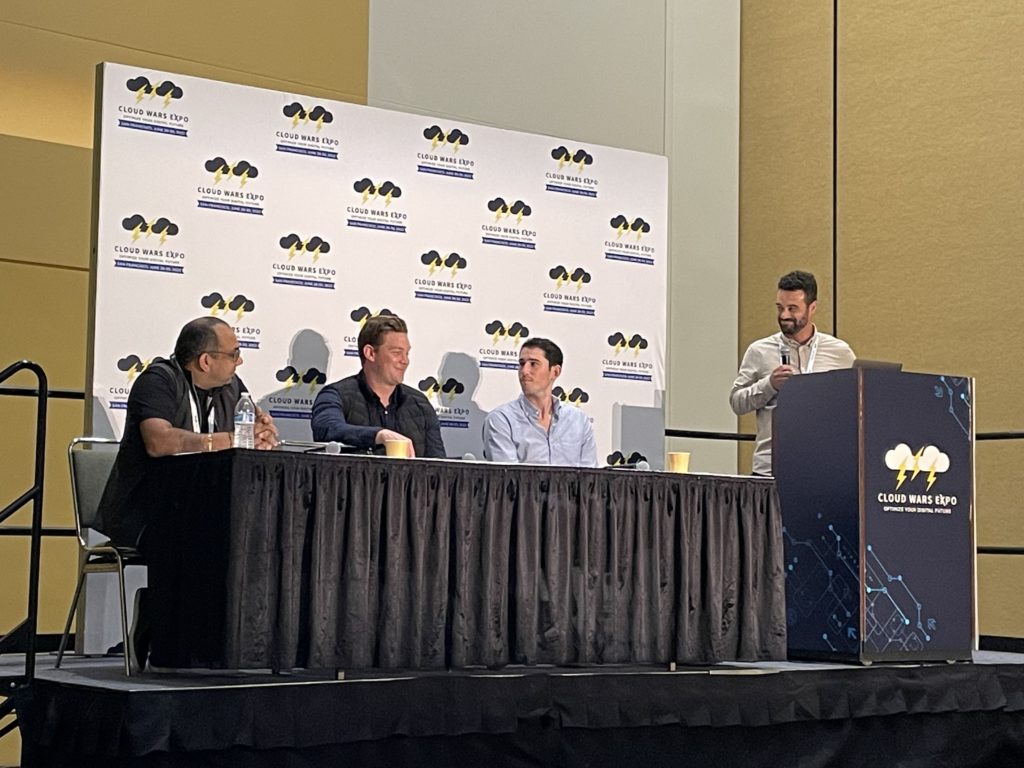The first Cloud Wars Expo just ended, and it’s time to break down what happened. In particular, I’d like to look back at the event through a My Metaverse Minute lens and place you on the path forward from here to next year’s Expo. Here are some top takeaways related to the Metaverse and interesting insights I drew from those action-packed days in San Francisco.
1. Metaverse and digital transformation
First and foremost, almost everyone was interested in learning more about the Metaverse and blockchain. While people less familiar still initially associated the concept with bored apes, video games, and Meta, it is obvious that the internet revolution has rattled even the most hard-shelled business folk into taking the Metaverse at least somewhat seriously by learning about it.
In my conversations throughout the event, I also noticed there is a shocking disparity in the level of knowledge different people have about the Metaverse. Some are hyper-bullish, referencing Gartner reports mid-conversation, while others have only heard the word before. This disparity extends to the topic of digital transformation in general; one of my Acceleration Economy (AE) colleagues pointed out that when told about the cloud, many businesses in the midwest would either not know what you’re talking about or say they don’t need it. Try telling this demographic about the next step of digital transformation, the Metaverse. Closing this disparity is one of the main goals of Acceleration Economy and was one outcome of the Cloud Wars Expo.
2. Cloud Wars Expo isn’t just a tech conference.
One of the wonderful things about Acceleration Economy and the Cloud Wars Expo is that they’re not just about technology. They live at the intersection of industry and tech. Everyone in the AE ecosystem, including the attendees of the Expo, is equipped with a double-edged sword of business acumen and technical expertise. This duality was infused in all of the sessions and created extremely interesting conversations in the hallways.
The cherry on top was the Innovation Path startup competition on Thursday. Startups had several minutes to pitch their company and a panel of judges decided which five startups were to receive rewards. Right across from tech giants like Google, Workday, Microsoft, and Oracle, these young companies were given a stage and an opportunity. This encapsulates the energy of the event extremely well, because the Expo wasn’t just about big businesses, about the cloud, or about dry technical topics. After the Innovation Path, everyone was chatting about the startups – a reminder that the most invigorating thing about the tech industry is starting a company and driving innovation from unexpected places and people, challenging long-standing traditions with bold new ideas.
Everyone at the Cloud Wars Expo and in the Acceleration Economy, regardless of how established they are, respects the young company, the student, the unestablished, the outsiders because they are keen to kindle the small flame and know the potential disruption. That’s why the Metaverse had a whole track, why dozens of startups were given such a powerful platform, and one of the things that made the Expo special.
3. It’s too early to think about Metaverse business models.
My favorite session was “Metaverse Business Models of the Future” hosted by Kieron Allen with Global Blockchain’s Digital Assets/Metaverse leader Anoop Nannra, co-founder of BlockWorks Jason Yanowitz, and CEO/co-founder of Framework Ventures Michael Anderson.
At one point they concluded that it is too early to think about business models in the Metaverse.
The audience perked up. What? Isn’t the session supposed to help you figure out models? But the guests conveyed the point expertly, and it went something like this.
In the early days of the Internet, there were protocol wars where data transfer protocols were still being compared. Since everyone was still arguing about the basic technical infrastructure of the Internet, it was simply impossible to imagine what businesses could emerge from it in the future. If you told an expert at the time that two of the biggest internet companies of the future would be about driving strangers around in your car and sending disappearing images of you with dog ears, they would’ve called you crazy.
At the end of one of my sessions, which criticized the model that Meta has in mind for the Metaverse, an audience member asked what I think a better model would be.
I was unable to answer. At first, I thought maybe I did something wrong, or I wasn’t thinking straight, or that I didn’t do my job right. But in reality, it’s impossible for anyone to tell what the killer model of the Metaverse will be in 10 or 15 years.
This issue is also present in many of the conversations we have about the Metaverse. Many executives try to take early action to gain first-mover advantages, which is commendable, but their approaches are still experimental. Models are unclear, and there’s a lot of confusion. Part of this is a communication issue that My Metaverse Minute tackles, but it’s also just very, very early.
The Metaverse conversation is still about emerging technologies, extrapolating trends, sizing markets, and exploring what some call the Wild West of tech. No concrete models have been set yet, experiences are generally limited, and there is no major company that is exclusively Metaverse. All the major players (Microsoft, Epic Games, Meta, etc) have branches exploring the spatial internet that are supported by other established business operations (selling software, video games, social media, etc). All of this means that exploration and learning is the only thing you can do as a company. Just don’t brush it off; instead, stay informed as the attendees of the Cloud Wars Expo do. While it may be too early for many companies to seriously invest in the metaverse, it’ll be no time before the next generation of billion-dollar business models emerges.
4. Crypto and blockchain are further than the spatial internet.
Even today companies can start exploring new monetization strategies, crypto integrations, go-to-market methods, DAOs, compensation schemes, blockchains for non-financial applications like supply chain, Web3 services like decentralized storage solutions such as Arweave or Filecoin, and so on.
This is the core idea I tried to convey in my session ‘Decentralized Science and Web3.’ Real value can be provided immediately to a well-defined target market by using blockchain-based technologies. Familiarizing yourself with some of these technologies will certainly pay off in the Metaverse, which many anticipate will go hand-in-hand.
Final words
In general, the Cloud Wars Expo was not geared to the Metaverse, and that’s not a bad thing. Everyone was there to use established tools and services to optimize their own business in what’s called ‘digital transformation.’ The Metaverse is the next step in this transformation, and the inclusion of the track in the Expo is a recognition of that.
It was great to see how everyone speaking on the topic came from varied backgrounds, from designers and entrepreneurs to outsiders and human relations specialists. All of these people realized it would impact their field, and that alone speaks volumes about the magnitude and far-reaching impact of this coming revolution. Transitioning to a 3D internet is far more than the next rung in the endless ladder that is digital transformation for corporations. It affects each and every one of us, and I was honored to speak on its behalf at the Cloud Wars Expo.
If you agree with any of those thoughts, I recommend you follow My Metaverse Minute and come to the Expo next year. You can also access sessions on-demand on cloudwarsexpo.com starting on July 20th.









